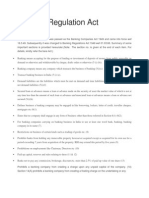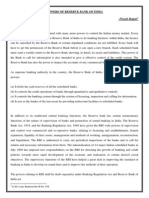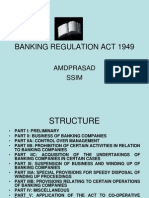LEGAL FRAMEWORK OF
REGULATIONS OF BANKS
�LEGAL FRAMEWORK OF REGULATIONS OF
BANKS:
1. BANKING REGULATION ACT 1949
2. RBI ACT 1934
�• The Reserve Bank of India was established on April 1,
1935 in accordance with the provisions of the
Reserve Bank of India Act, 1934.
• “To regulate the issue of Bank Notes and keeping of
reserves with a view to securing monetary stability in
India and generally to operate the currency and credit
system of the country to its advantage."
• The Reserve Bank's affairs are governed by a central
board of directors. The board is appointed by the
Government of India in keeping with the Reserve Bank
of India Act
�RBI
Reserve bank of India (RBI) as the central bank
of the country occupies a significant place in
the Indian banking and financial system. RBI
was established in 1935,under the RBI act
1934.As an apex institutions it act as a guide,
Regulator, controller and promoter of the
financial system
�Establishment and incorporation of Reserve Bank.
(1) A bank to be called the Reserve Bank of India shall
be constituted for the purposes of taking over the
management of the currency from the Central
Government and of carrying on the business of
banking in accordance with the provisions of this Act
(2) The Bank shall be a body corporate by the name of
the Reserve Bank of India, having perpetual
succession and a common seal, and shall by the said
name sue and be sued.
�Composition of the Central Board, and term of office of Directors
(1) The Central Board shall consist of the following Directors, namely:-
(a) a Governor and not more than four Deputy Governors to be appointed
by the Central Government;
(b) four Directors to be nominated by the Central Government, one from
each of the four Local Boards as constituted by section 9;
(c) Directors to be nominated by the Central Government; and
(d) two Government officials to be nominated by the Central
Government;]
(2)The Governor and Deputy Governors shall devote their whole time to
the affairs of the Bank, and shall receive such salaries and allowances
as may be determined by the Central Board, with the approval of the
Central Government
�Organization and management
The general affairs and business of the banks managed by
the central board of directors having 20 members. The
members include the following :
A governor and not more than 4 deputy governors to be
appointed by the central govt.
4 directors to be nominated by the central govt. ,one each
from the 4 local boards.
10 directors to be nominated by the central govt.
One govt. official to be nominated by the central govt.
�Meetings of the Central Board.
(1) Meetings of the Central Board shall be convened by the
Governor at least six times in each year and at least once in
each quarter.
(2) Any four Directors may require the Governor to convene a
meeting of the Central Board at any time and the Governor
shall forthwith convene a meeting accordingly.
(3) The Governor, or if for any reason, he is unable to attend, the
Deputy Governor authorized by the Governor under the
provison to subsection (3) of section 8 to vote for him, shall
preside at meetings of the Central Board, and, in the event of
an equality of votes, shall have a second or casting vote.
�Departments of RBI
Issue department Banking department
Banking development department
Department of banking operations
Department of non banking companies
Department of legal affairs
Exchange control department
Department of agricultural credit Department of industrial finance
Economics department
Department of research and statistics
Inspection department
Department of planning and re-organization
RBI services board
Department of accounts and expenditure
Department of supervision
�Functions of RBI Department
• As currency authority
• Banker authority
• Advisor to the government
• Banker’s bank
• Lender of the last resort
• Supervision of bank
• Controller of money supply & credit
• Foreign exchange Control & Management
• Monetary data & publications
• Promotional functions -
promotion of commercial banking
promotion of cooperative banking
promotion of agriculture & rural credit
promotion of industrial finance
Promotion of finance of exports
�Banking Regulation Act,1949
The banking co act embodying comprehensive legislation for the
regulation & control of banking was finally passed by the
legislature in Feb 1949 & come into force on 16 March 1949.
the name of the act itself was changed to banking regulation act
on the 1 march 1966 when banking law come into force
Short title, extent and commencement
This Act may be called the Banking 2[Regulation] Act, 1949.It
extends to the whole of India
It shall come into force on such date5 as the Central
Government may, by notification in the Official Gazette, appoint
in this behalf.
�• Form and business in which banking companies may engage
•
(a) the borrowing, raising, or taking up of money; the lending or advancing
of money either upon or without security; and drawing, making, accepting,
discounting, buying, selling, collecting and dealing in bills of exchange,
hundies, promissory notes etc.
(b) acting as agents for any government or local authority or any other
person or persons
(c) contracting for public and private loans and negotiating and issuing the
same;
(d) the effecting, insuring, guaranteeing, underwriting, participating in
managing and carrying out of any issue, public or private, of State,
municipal or other loans or of shares, s
(e) carrying on and transacting every kind of guarantee and indemnity
business;
(f) managing, selling and realising any property which may come into the
possession of the company in satisfaction or part satisfaction of any of its
claims;
�Act provides:
Classification of co. into banking & non banking co: Sec 5(b) defines as
“accepting for the purpose of lending or investment, of deposits of
money from the public, repayable on demand or otherwise by
cheque, draft or otherwise.”Depending on the fact whether their
principle business consists of this the company can be classified into
banking & non banking.
Minimum paid-up capital: Sec 11 prescribe minimum cap. Requirement
for banking co.Foreign Bank: Bank incorporated outside india must
have its paid up cap & res not less than 15 lakhs & if it have a place
in bombay & calcutta then 20 lakhs.Indian bank: Incorporated within
India shall have capital not less than 5 lakhs.Acc to new norms,
banks are required to achieve a capital adequacy ratio.
�Licensing of banking co.: 28 banks in the public sector are not required to hold a license.Provision of
sec22 prescribe only a system of licensing, having for its objects the regulation of the business of
banking, & these do not violate fundamental right of any person to carry on the business.
Restriction & control on loans & advances: No banking co shall enter into any commitment for
granting any loans & advances to or on behalf of:
Any of its directors
Any firm in which any of its director is interested as partner, manager, employee.
Any co of which any of the director of banking co is a director
Any individual in respect of whom any of its director is a partner or gurantor
Restriction on branch banking: Sec 23 place restriction on the opening of new offices & transfer of
existing place to avoid wasteful expenditurein money & resource. Before opening it prior
permission of RBI is necessary which it grant after satisfying itself by means of inspection of
banking co.
A/cs & balance sheet: Sec 29 provides preparation of these in the form set out in the 3rd schedule. They
have to be prepared as on the last working day of the year in respect of all business transacted by a
banking co. incorporated in india.Sec 31 provides for the publication of the P & L a/c, balance sheet
& the auditor’s report in the prescribed manner as well as for the submission of 3 copies thereof as
returns to the Reserve Bank.
�Inspection of banking company: Sec 35 confers very wide powers upon the
reserve bank to cause an inspection of any banking co. & its book of
a/c.Such an inspection is made by one or more of the officer of the
reserve bank.The widened objective of the statutory inspection is to
ensure that a banking co. complies with the provisions of the Banking
regulation act.
Suspension of business & winding up :Part III of the banking co lays special
provision relating to it, the more imp features of which are:
Total period of moratorium has been limited to 6 months
The RBI has been empowered in cases where it makes an application to the
court in this behalf to undertake the liquidation of banking co.
Period prescribed under sec 177(b) of the banking co act for submission of
a preliminary report by the official liquidator has been reduced to 2
months.
�Scheme of arrangement & amalgamation: Sub sec 1(B) of sec 36 of act stipulate that
RBI may assists as an intermediary in proposals for the amalgamation of such co.
RBI could apply to central govt for an order of moratorium in respect of a banking co
where it that there was a good reason to do so. During the period of moratorium
RBI may prepare a scheme :
Powers to give directions: It may pass order specify therein:
To call meeting of its directors
To require an officer of bank directions to discuss any matter ith officer of reserve
bank.
To depute one or more of its officer to watch the proceeding of any meeting of the
board of director of banking co.
To appoint one or more officer to observe the manner in which the affair of the banks
are being conducted.
To require the banking co to make such changes in the mgmt & within such time as
the reserve bank considers necessary.
�Election of new Directors
The Reserve Bank may, by order, require any banking company to call a general
meeting of the shareholders of the company within such time, not less than two
months from the date of the order, as may be specified in the order or within
such further time as the Reserve Bank may allow in this behalf, to elect in
accordance with the voting rights permissible under this Act fresh Directors, and
the banking company shall be bound to comply with the order.
Every Director elected under sub-section (1) shall hold office until the date up to
which his predecessor would have held office, if the election had not been held.
Any election duly held under this section shall not be called in question in any
court
Restriction on commission, brokerage, discount, etc., on sale of shares
Notwithstanding anything to the contrary contained in 48[sections 76 and 79 of the
Companies Act, 1956 (1 of 1956)1, no banking company shall pay out directly or
indirectly by way of commission, brokerage, discount or remuneration in any
form in respect of any shares issued by it, any amount exceeding in the
aggregate two and one-half per cent of the paid-up value of the said shares.
Prohibition of charge on unpaid capital
No banking company shall create any charge upon any unpaid capital of the
company, and any such charge shall be invalid.


















































































